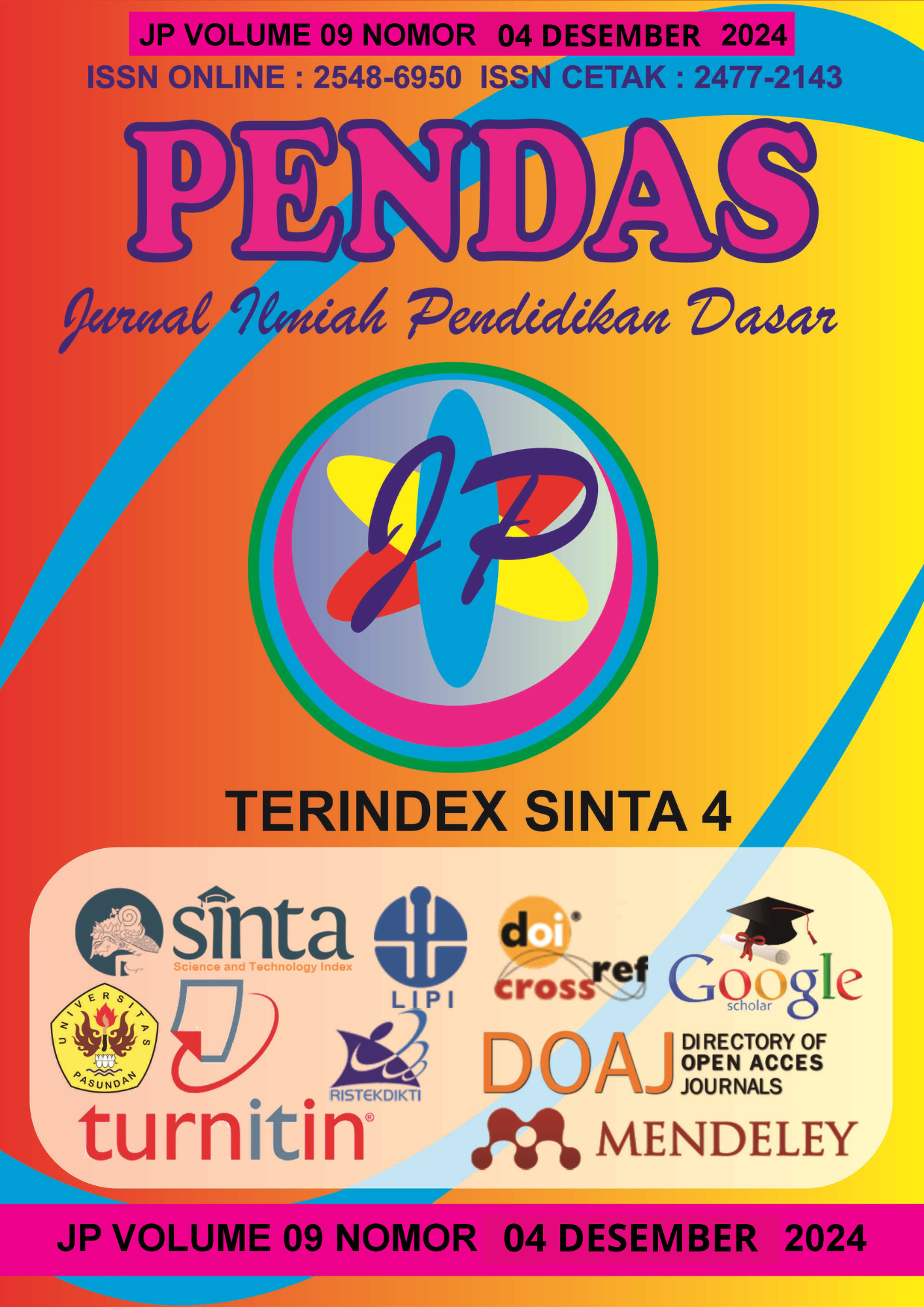KEEFEKTIFAN MODEL PROBLEM BASED LEARNING (PBL) TERHADAP PENINGKATAN KEMAMPUAN BERPIKIR KRITIS DAN PENGUASAAN KOMPETENSI MINIMUM MATERI GAYA KELAS IV SEKOLAH DASAR
DOI:
https://doi.org/10.23969/jp.v9i04.20882Keywords:
Problem-Based Learning, Critical Thinking, Minimum CompetenciesAbstract
This research was motivated by the need for an effective learning model to improve critical thinking skills and students' mastery of minimum competencies, particularly in science subjects at the elementary school level. Conventional teaching methods remain dominant, leading to less active participation and limited critical thinking practice. This study aims to analyze the effectiveness of the Problem-Based Learning (PBL) model in enhancing critical thinking skills and mastery of minimum competencies on the topic of force in fourth-grade elementary students. This quantitative research employed a quasi-experimental method with a Nonequivalent Control Group Design. Data collection techniques included tests, observations, and documentation. Data were analyzed using normality tests, homogeneity tests, T-tests, and N-Gain tests. The study involved 50 fourth-grade students from SDN Bulusari 02 and SDN Rancawuluh 02, divided into experimental and control groups. The results showed that the PBL model significantly improved critical thinking skills and minimum competency mastery. The experimental group had a higher average pretest-to-posttest score increase than the control group. The T-test showed a significance value of 0.000 < 0.05, indicating a significant difference. N-Gain tests revealed improvements of 0.62 in critical thinking and 0.63 in minimum competency mastery, both in the moderate category. These findings suggest that Problem-Based Learning is effective in enhancing critical thinking and competency mastery.
Downloads
References
Buku :
Creswell, J. W. (2014). Penelitian Kualitatif & Desain Riset. Pustaka Pelajar.
Sitorus, A., & Harahap, H. A. (2019). Gerakan inovasi mendidik berkarakter. Swalova Publishing.
Sugiyono. (2021). Metode Penelitian Kuantitatif, Kualitatif, dan R&D. Alfabeta.
Sulistyanto, H., & Wiyono, E. (2008). ilmu pengetahuan alam. Pusat Perbukuan, Departemen Pendidikan.
Tiastra, M. (2022). Model Pembelajaran Inkuiri Terbimbing. CV Bintang Semesta Media.
Jurnal :
Affandy, H., Sunarno, W., Suryana, R., & Harjana. (2024). Integrating creative pedagogy into problem-based learning: The effects on higher order thinking skills in science education. Thinking Skills and Creativity, 53, 101575. https://doi.org/10.1016/j.tsc.2024.101575
Andarini, T. (2012). Pembelajaran Biologi Menggunakan Pendekatan CTL (Contextual Teaching and Learning) Melalui Media Flipchart dan Video Ditinjau dari Kemampuan Verbal dan Gaya Belajar.
Anggraeni, D. M., Prahani, B. K., Suprapto, N., Shofiyah, N., & Jatmiko, B. (2023). Systematic review of problem based learning research in fostering critical thinking skills. Thinking Skills and Creativity, 49, 101334. https://doi.org/10.1016/j.tsc.2023.101334
Aslan, A. (2021). Problem- based learning in live online classes: Learning achievement, problem-solving skill, communication skill, and interaction. Computers & Education, 171, 104237. https://doi.org/10.1016/j.compedu.2021.104237
Fahrudin, Ansari, & Ichsan, A. S. (2021). Pembelajaran Konvensional dan Kritis Kreatif dalam Perspektif Pendidikan Islam. Hikmah, 18(1), 64–80. https://doi.org/10.53802/hikmah.v18i1.101
Farikhah, L., Reffiane, F., Alimah, S., & ... (2024). Pengaruh Model Pembelajaran Problem Based Learning (PBL) Berbantuan Media Papan Perkalian Terhadap Kemampuan Literasi Numerasi Kelas II SDN …. Innovative: Journal Of …, 4, 9038–9047. http://j-innovative.org/index.php/Innovative/article/view/13620%0Ahttps://j-innovative.org/index.php/Innovative/article/download/13620/9442
Firdaus, A., Nisa, L. C., & Nadhifah, N. (2019). Kemampuan Berpikir Kritis Siswa pada Materi Barisan dan Deret Berdasarkan Gaya Berpikir. Kreano, Jurnal Matematika Kreatif-Inovatif, 10(1), 68–77.
Hariati, A., Pambudi, D. S., Kurniati, D., Septiadi, D. D., & Gantiyani, H. (2022). Student’s Open-Mindedness Behavior in Solving Math-Based Problem with Contradictory Information and Problem with No Specified Universal Set. AIP Conference Proceedings, 2633(1).
Hartati, R., & Sholihin, H. (2015). Meningkatkan Kemampuan Berpikir Kritis Siswa Melalui Implementasi Model Problem Based Learning (PBL) pada Pembelajaran IPA Terpadu Siswa SMP. Prosiding Simposium Nasional Inovasi Dan Pembelajaran Sains, 1(1), 1–5.
Hastuti, K. P., Arisanty, D., Basuki, S., Dharmono, D., & Rachman, A. (2024). Developing Students’ Critical Thinking Skills Through Differentiated Problem-Based Learning. Pedagogika, 155(3). https://doi.org/10.15823/p.2024.155.9
Liu, Y., & Pásztor, A. (2022). Effects of problem-based learning instructional intervention on critical thinking in higher education: A meta-analysis. Thinking Skills and Creativity, 45, 101069. https://doi.org/10.1016/j.tsc.2022.101069
Mahendra, I. W. E. (2019). Asesmen Alternative dalam Pembelajaran Matematika. Prosiding Senama PGRI, 1, 12–19.
Masliah, L., Nirmala, S. D., & Sugilar, S. (2023). Keefektifan Model Pembelajaran Problem Based Learning ( PBL ) terhadap Kemampuan Literasi dan Numerasi Peserta Didik di Sekolah Dasar. Jurnal Basicedu, 7(1), 1–10. https://doi.org/10.31004/basicedu.v7i1.4106
Nuswowati, M., Susilaningsih, E., Ramlawati, R., & Kadarwati, S. (2017). Implementation of Problem-Based Learning with Green Chemistry Vision to Improve Creative Thinking Skill and Students’ Creative Actions. Jurnal Pendidikan IPA Indonesia, 6(2), 221–228.
Perdana, R., & Suswandari, M. (2021). Literasi Numerasi dalam Pembelajaran Tematik Siswa Kelas Atas Sekolah Dasar. Absis: Mathematics Education Journal, 3(1), 9–15.
Putra, P. (2017). Pendekatan Etnopedagogi dalam Pembelajaran IPA SD/MI. Primary Education Journal (PEJ), 1(1), 17–23.
Qomariyah, H. (2016). Pengaruh Penggunaan Media Pembelajaran Berbasis Information and Communication Technology (ICT) Terhadap Motivasi dan Hasil Belajar IPA Kelas 4 MI Miftahul Ulum Jarak Kulon Jogoroto Jombang.
Rahayu, A., & Hermansyah, B. (2024). The Influence of the Problem Based Learning Model on Student’s Learninf Outcomes. Esteem Journal of English Education Study Programme, 7(2), 334–347.
Ratnawati, D., Handayani, I., & Hadi, W. (2020). Pengaruh Model Pembelajaran PBL Berbantu Question Card terhadap Kemampuan Berpikir Kritis Matematis Siswa SMP. Edumatica: Jurnal Pendidikan Matematika, 10(01), 44–51.
Redhana, I. W. (2019). Mengembangkan Keterampilan Abad ke-21 dalam Pembelajaran Kimia. Jurnal Inovasi Pendidikan Kimia, 13(1).
Rusydiyah, E. F., Ummah, F. S., & Mudlofir, A. (2020). The Implementation of Laptop Mobile in the Teaching-Learning Process in Islamic Boarding School. TARBIYA: Journal of Education in Muslim Society, 7(1), 67–77.
Setyawan, M., & Dewi Koeswanti, H. (2021). Pembelajaran Problem Based Learning Terhadap Berpikir Kritis Peserta Didik Sekolah Dasar. 9(3), 489–496. https://ejournal.undiksha.ac.id/index.php/JJPGSD
Suryani. (2023). Improving Students’ Literacy and Numeracy Skills Theme of My Obligations and Rights through Problem Based Learning Model for Grade 3 Students of SD Negeri 2 Ngalas in the 2022/2023 Academic Year. Social, Humanities, and Education Studies (SHEs): Conference Series, 5(6), 1040–1046.
Widiastuti, E. R., & Kurniasih, M. D. (2021). Pengaruh Model Problem Based Learning Berbantuan Software Cabri 3D V2 terhadap Kemampuan Literasi Numerasi Siswa. Jurnal Cendekia : Jurnal Pendidikan Matematika, 5(2), 1687–1699. https://doi.org/10.31004/cendekia.v5i2.690
Downloads
Published
Issue
Section
License
Copyright (c) 2025 Pendas : Jurnal Ilmiah Pendidikan Dasar

This work is licensed under a Creative Commons Attribution 4.0 International License.














































